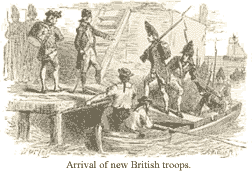The Grenville government built up British troop strength in colonial North America at the end of the French and Indian War to protect the colonies against threats posed by remaining Frenchmen and Indians.
In March 1765, Parliament passed the Quartering Act to address the practical concerns of such a troop deployment. Under the terms of this legislation, each colonial assembly was directed to provide for the basic needs of soldiers stationed within its borders. Specified items included bedding, cooking utensils, firewood, beer or cider and candles. This law was expanded in 1766 and required the assemblies to billet soldiers in taverns and unoccupied houses.
 British motivations for enforcing the Quartering Act were mixed. Some officials were legitimately concerned about protecting the colonies from attack and viewed this law as a logical means to do so. Also part of the calculation, however, was a desire to cut costs. If the colonies were to be protected, why should they not pay for the soldiers? In particular, the British ministry was faced with the prospect of bringing home the French and Indian War veterans and providing them with pay and pensions. If those soldiers could be kept in service in America, the colonies would pay for them and spare a tax-weary English public from additional burdens.
During the Stamp Act unrest of 1765 and early 1766, increasing numbers of soldiers were stationed in or near American cities. Some of those were new units brought from England; others were transferred from western posts, a move that enabled the Indians to regain the offensive on some portions of the frontier.
The reaction of the colonists was largely negative and was rooted in two issues:
British motivations for enforcing the Quartering Act were mixed. Some officials were legitimately concerned about protecting the colonies from attack and viewed this law as a logical means to do so. Also part of the calculation, however, was a desire to cut costs. If the colonies were to be protected, why should they not pay for the soldiers? In particular, the British ministry was faced with the prospect of bringing home the French and Indian War veterans and providing them with pay and pensions. If those soldiers could be kept in service in America, the colonies would pay for them and spare a tax-weary English public from additional burdens.
During the Stamp Act unrest of 1765 and early 1766, increasing numbers of soldiers were stationed in or near American cities. Some of those were new units brought from England; others were transferred from western posts, a move that enabled the Indians to regain the offensive on some portions of the frontier.
The reaction of the colonists was largely negative and was rooted in two issues:
If the British Parliament has a legal authority to issue an order that we shall furnish a single article for the troops here and compel obedience to that order, they have the same right to issue an order for us supply those troops with arms, clothes, and every necessary, and to compel obedience to that order also; in short, to lay any burdens they please upon us. What is this but taxing us at a certain sum and leaving us only the manner of raising it? How is this mode more tolerable than the Stamp Act?The Quartering Act was amended in 1774, when it would again ignite the fears of many Americans.